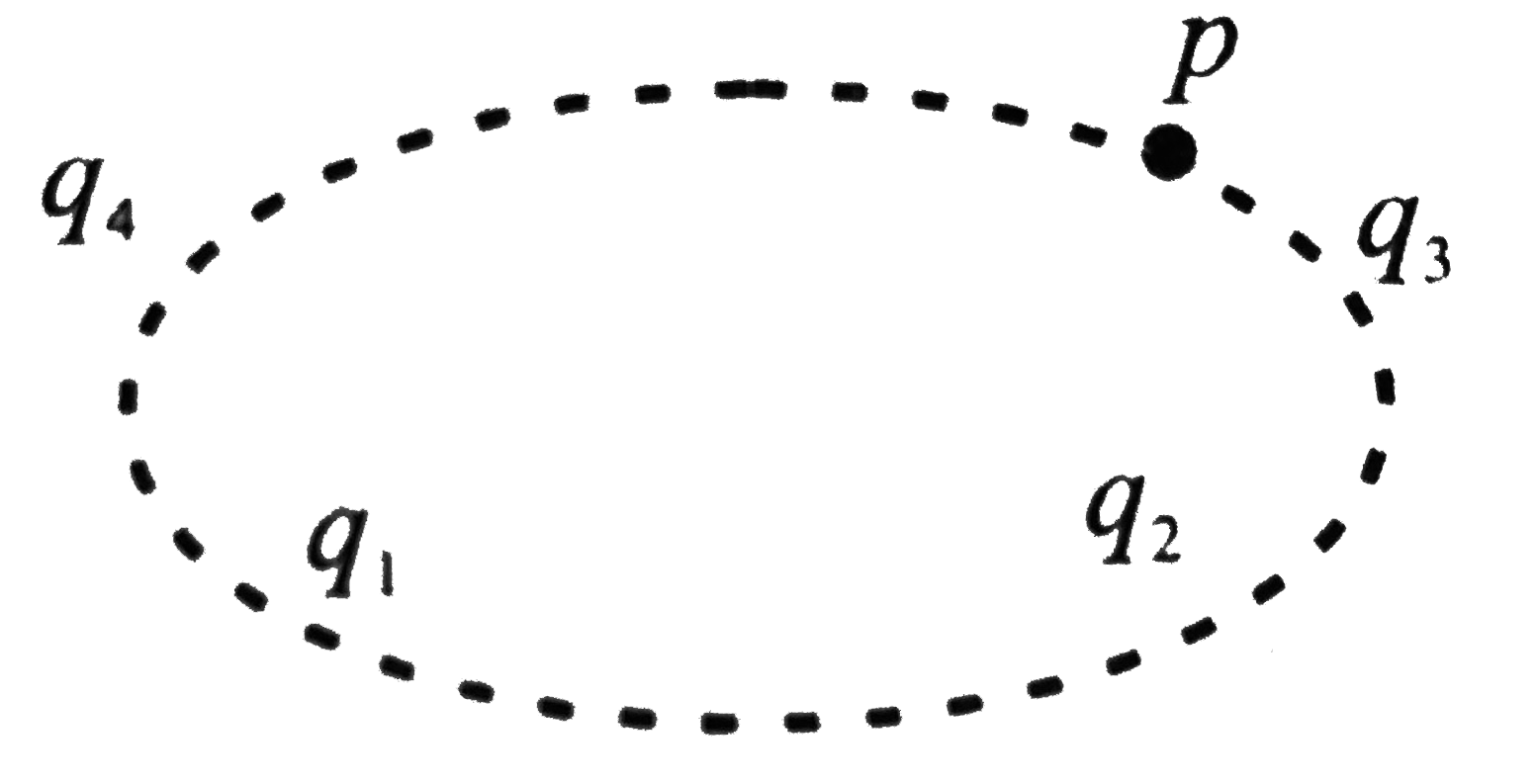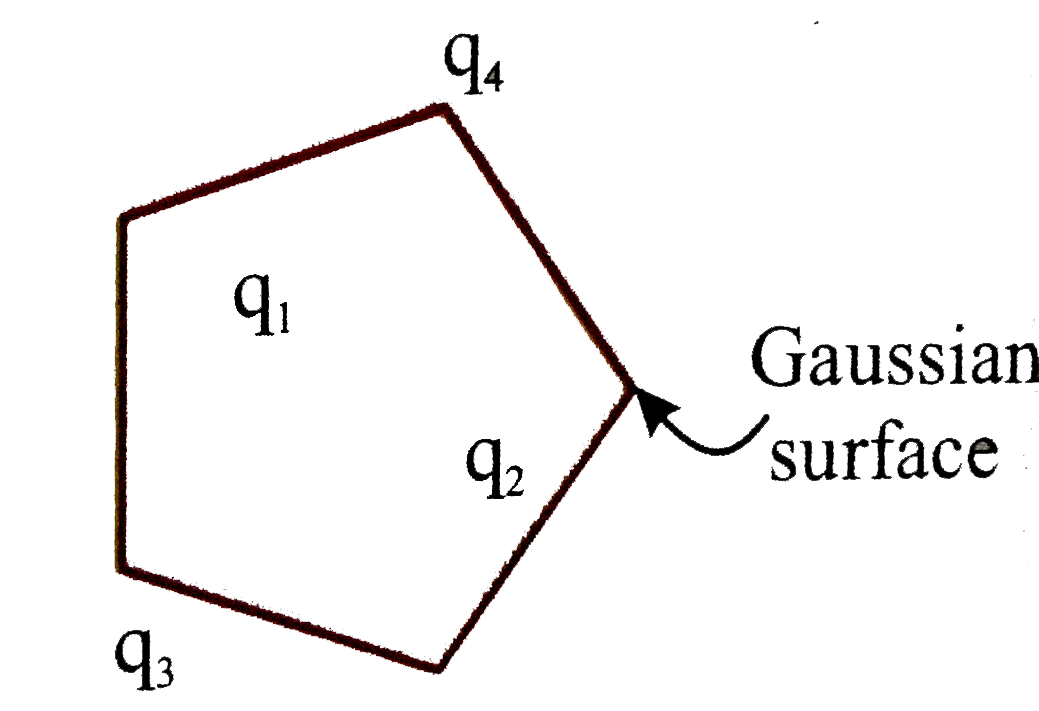Gauss's law and Coulomb's law , although expressed in different forms , are equivalent ways of describing the relation between charge and electric field in static conditions . Gauss's law is ε0ϕ=qencl,when q(encl) is the net charge inside an imaginary closed surface called Gaussian surface. The two equations hold only when the net charge is in vaccum or air .
If the charge q3 and q4 are displaced (always remaining outside the Gaussian surface), then consider the following two statements :
A: Electric field at each point on the Gaussian surface will remain same .
B: The value of ∮→E.d→A for the Gaussian surface will remain same.
Both A and B are true .
Both A and B are false.
A is true , but b is false.
B is true , but A is false.
The correct Answer is:D
Electric field will change since two of the charges are displaced from their earlier position , while flux will not change since q1 and q2 are still inside the surface.
Topper's Solved these Questions
- BOOK - CENGAGE PHYSICSCHAPTER - ELECTRIC FLUX AND GAUSS LAWEXERCISE - Subjective type7videos
ELECTRIC FLUX AND GAUSS LAW
- BOOK - CENGAGE PHYSICSCHAPTER - ELECTRIC FLUX AND GAUSS LAWEXERCISE - MCQ s38videos
ELECTRIC FLUX AND GAUSS LAW
- BOOK - CENGAGE PHYSICSCHAPTER - ELECTRIC FLUX AND GAUSS LAWEXERCISE - Multiple Correct8videos
ELECTRIC FLUX AND GAUSS LAW
- BOOK - CENGAGE PHYSICSCHAPTER - ELECTRIC CURRENT AND CIRCUITEXERCISE - Interger8videos
ELECTRIC CURRENT AND CIRCUIT
- BOOK - CENGAGE PHYSICSCHAPTER - ELECTRIC POTENTIALEXERCISE - DPP 3.514videos
ELECTRIC POTENTIAL
Similar Questions
Knowledge Check
- Question 1 - Select One
Gauss's law and Coulomb's law , although expressed in different forms , are equivalent ways of describing the relation between charge and electric field in static conditions . Gauss's law is ε0ϕ=qencl,when q(encl) is the net charge inside an imaginary closed surface called Gaussian surface. The two equations hold only when the net charge is in vaccum or air .
The net flux of the electric field through the surface isAdue to q1 and q2 onlyBdue to q3 and q4 onlyCequal due to all the four chargesDcannot say - Question 2 - Select One
Gauss's law and Coulomb's law , although expressed in different forms , are equivalent ways of describing the relation between charge and electric field in static conditions . Gauss's law is ε0ϕ=qencl,when q(encl) is the net charge inside an imaginary closed surface called Gaussian surface. The two equations hold only when the net charge is in vaccum or air .
The net flux of the electric field through the surface due to q3 and q4 isAzeroBpositiveCnegativeDcannot say - Question 3 - Select One
Gauss's law and Coulomb's law , although expressed in different forms , are equivalent ways of describing the relation between charge and electric field in static conditions . Gauss's law is ε0ϕ=qencl,when q(encl) is the net charge inside an imaginary closed surface called Gaussian surface. The two equations hold only when the net charge is in vaccum or air .
A Gaussian surface encloses two of the four positively charged particles. The particles that contribute to the electric field at a point P on the surface are
 Aq1 and q2Bq2 and q3Cq4 and q3Dq1,q2,q3 and q4
Aq1 and q2Bq2 and q3Cq4 and q3Dq1,q2,q3 and q4
In Gauss' s theorem ∮sEds=qε0 The surface integral is evaluated by choosing a closed surface called the Gaussian surface. Here
View SolutionA charge q is inside a closed surface and charge -q is outside. The out going electric flux is
View SolutionThe surface considered for Gauss's law is called
View SolutionAssertion: Four point charges q1,q2,q3 and q4 are as shown in Fig,The flux over the shown Gaussians surface depends only on charges q1 and q2
Reason:Electric field at all points on Gaussians surface depends on any charges q1 and q2
 View Solution
View SolutionA+q1 charge is at centre of an imaginary spherical Gaussion surface 'S', and −q1 charge is placed nearby this +q1 charge inside 'S'. A charge +q2 is located outside this Gaussian surface. Then electric field on Gaussian surface will be :
View Solution
